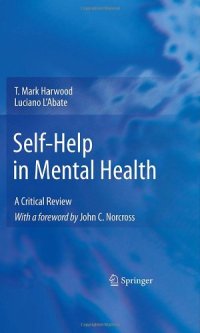
Ebook: Self-Help in Mental Health: A Critical Review
- Genre: Other Social Sciences // Philosophy: Critical Thinking
- Tags: Clinical Psychology, Psychotherapy, Social Work
- Year: 2010
- Publisher: Springer-Verlag New York
- Edition: 1
- Language: English
- pdf
They’re fast, cheap, and promise amazing results—no wonder more people seek mental health advice from self-help books and sites rather than seeking therapy. Complicating this picture: many resources are inappropriate, ineffective, even dangerous. For the clinicians who would gladly recommend self-help for their clients, the challenge is finding reliable, evidence-based sources of help among the vast quantities available.
Self-Help in Mental Health: A Critical Review guides readers through this plethora of materials, organizing it into useful order, evaluating popular approaches and trends, and recommending clinically valid, science-based resources for specific clinical and sub-clinical problems. Its authors explain how and why such methods work, offering innovative uses for self-help in prevention and promotion, therapy and rehabilitation, including strengthening therapeutic gains (akin to homework in cognitive-behavioral therapy) and encouraging self-reliance. While some may be tempted to write-off all self-help as quackery or therapy-lite, Harwood and L'Abate recognize the potential the self-help movement holds for countering the stigma associated with mental health treatments. Further, self-help resources represent a viable means of reaching under-served populations, and, for some individuals, they are preferable to conventional therapy.
Included in the coverage:
- Recommendations for books, web sites, organizations, support groups, hotlines, and audio-visual materials
- Depression, anxiety, eating disorders, addictions, and other conditions.
- Guidelines for evaluating self-help and guided self-support materials.
- Strategies for integrating self-help with traditional modes of therapy.
- Assessment tools for determining client appropriateness for self-help.
- New directions in theories of self-help and self-change.
- Contraindications for self-help approaches.
Concise and comprehensive, Self-Help in Mental Health is timely reading that will enhance the work of psychotherapists and family and couples therapists, as well as researchers in clinical psychology, psychiatry, and other mental health fields.
They’re fast, cheap, and promise amazing results—no wonder more people seek mental health advice from self-help books and sites rather than seeking therapy. Complicating this picture: many resources are inappropriate, ineffective, even dangerous. For the clinicians who would gladly recommend self-help for their clients, the challenge is finding reliable, evidence-based sources of help among the vast quantities available.Self-Help in Mental Health: A Critical Review guides readers through this plethora of materials, organizing it into useful order, evaluating popular approaches and trends, and recommending clinically valid, science-based resources for specific clinical and sub-clinical problems. Its authors explain how and why such methods work, offering innovative uses for self-help in prevention and promotion, therapy and rehabilitation, including strengthening therapeutic gains (akin to homework in cognitive-behavioral therapy) and encouraging self-reliance. While some may be tempted to write-off all self-help as quackery or therapy-lite, Harwood and L'Abate recognize the potential the self-help movement holds for countering the stigma associated with mental health treatments. Further, self-help resources represent a viable means of reaching under-served populations, and, for some individuals, they are preferable to conventional therapy.Included in the coverage: Recommendations for books, web sites, organizations, support groups, hotlines, and audio-visual materials, depression, anxiety, eating disorders, addictions, and other conditions, guidelines for evaluating self-help and guided self-support materials, strategies for integrating self-help with traditional modes of therapy, assessment tools for determining client appropriateness for self-help, new directions in theories of self-help and self-change, contraindications for self-help approaches.Concise and comprehensive, Self-Help in Mental Health is timely reading that will enhance the work of psychotherapists and family and couples therapists, as well as researchers in clinical psychology, psychiatry, and other mental health fields.